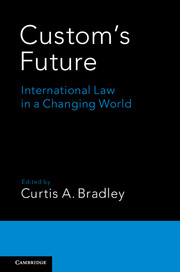Book contents
- Frontmatter
- Dedication
- Contents
- Notes on Contributors
- Introduction: Custom's Future
- 1 Custom's Past
- 2 Customary International Law Adjudication as Common Law Adjudication
- 3 Customary International Law as a Dynamic Process
- 4 Custom, Jus Cogens, and Human Rights
- 5 Customary International Law: How Do Courts Do It?
- 6 Custom's Method and Process: Lessons from Humanitarian Law
- 7 The Growing Obsolescence of Customary International Law
- 8 The Strange Vitality of Custom in the International Protection of Contracts, Property, and Commerce
- 9 The Decline of Customary International Law as a Source of International Criminal Law
- 10 Customary International Law and Public Goods
- 11 Reinvigorating Customary International Law
- 12 The Evolution of Codification: A Principal-Agent Theory of the International Law Commission's Influence
- 13 Custom and Informal International Lawmaking
- 14 Custom's Bright Future: The Continuing Importance of Customary International Law
- Bibliography
- Index
2 - Customary International Law Adjudication as Common Law Adjudication
Published online by Cambridge University Press: 05 February 2016
- Frontmatter
- Dedication
- Contents
- Notes on Contributors
- Introduction: Custom's Future
- 1 Custom's Past
- 2 Customary International Law Adjudication as Common Law Adjudication
- 3 Customary International Law as a Dynamic Process
- 4 Custom, Jus Cogens, and Human Rights
- 5 Customary International Law: How Do Courts Do It?
- 6 Custom's Method and Process: Lessons from Humanitarian Law
- 7 The Growing Obsolescence of Customary International Law
- 8 The Strange Vitality of Custom in the International Protection of Contracts, Property, and Commerce
- 9 The Decline of Customary International Law as a Source of International Criminal Law
- 10 Customary International Law and Public Goods
- 11 Reinvigorating Customary International Law
- 12 The Evolution of Codification: A Principal-Agent Theory of the International Law Commission's Influence
- 13 Custom and Informal International Lawmaking
- 14 Custom's Bright Future: The Continuing Importance of Customary International Law
- Bibliography
- Index
Summary
The standard view today of customary international law (CIL) is that it arises from the widespread and consistent practice of states followed out of a sense of legal obligation. Although commonly recited, this account is plagued by evidentiary, normative, and conceptual difficulties, and it has been subjected to increasing criticism in recent years. This chapter suggests that these difficulties stem in part from the effort to formulate one conception of CIL that applies across all institutional contexts. This chapter posits a particular account of CIL, considered from the perspective of international adjudication. The application of CIL by an international adjudicator, this chapter suggests, is best understood in terms similar to the judicial development of the common law: that is, as an approach whereby adjudicators look to past practice but necessarily make choices about how to describe it, which baselines to apply in evaluating it, and whether and when to extend or analogize it to new situations. These choices, moreover, are shaped by assessments of both state preferences and the likely consequences of adopting a particular formulation of the relevant international rule, as well as moral and ethical considerations. Unlike the standard view of CIL, this common law account recognizes a significant element of judgment and creativity in determining the content of CIL. Understanding the adjudication of CIL in this way, the chapter contends, avoids many of the difficulties surrounding the standard view of CIL.
PROBLEMS WITH THE STANDARD VIEW OF CIL
As noted, the generally accepted view among international lawyers and scholars today is that CIL arises from the consistent practices of states that are followed out of a sense of legal obligation, an account that this chapter will refer to as the “standard view.” Under this standard view, CIL is conceived of as having two components: an objective, state practice component, and a subjective, sense of legal obligation component. The second component is sometimes referred to by the Latin phrase opinio juris sive necessitatis, which translates as “a belief that something is required by law or necessity,” although commentators and courts often shorten the phrase simply to opinio juris. This account of CIL has been endorsed by international tribunals, including the International Court of Justice (ICJ), and it is often recited by representatives of states.
- Type
- Chapter
- Information
- Custom's FutureInternational Law in a Changing World, pp. 34 - 61Publisher: Cambridge University PressPrint publication year: 2016

